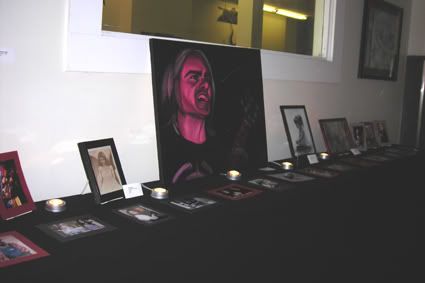"Yes, yes, you're all very sorry," said Ms. Minnie Parish with a dismissive wave of her hand. "It's such a tragedy, a real shame, et cetera et cetera. And I'm grateful, I am. But I'm not here for your sympathies. I'm here to talk business."
"Then we'll get right to it," said Kevin Hume. Hume appreciated a woman like Parish. He'd have liked to have more people like her working at Bloodlust. But he'd built his production company from the ground up (mostly) on his own, and still essentially ran it on his own. If you want something done right...
"I've never heard of someone willing their body and estate to a movie before, but I don't think we'll have many problems. If you can donate your body to science or have your ashes shot from a cannon, surely you can use it in a horror movie."
Cease and Rector, his lawyer and assistant, nodded their pointy heads.
"I've got some paperwork drawn up," said Cease, sliding a short stack across the table to Parish.
"Does this include a written description of my roles? Both of them?"
"Of course. We'll film the living scenes and hauntings first, while you're still in fair health. And afterwards..." Rector cringed. He couldn't speak of her impending death as practically as Hume. "Afterwards, we'll complete the other scenes."
Parish smiled and reached for her pen. Rector thought she looked dead already.
Parish was a widow. She had no children. She'd never been a celebrity or an artist or a politician. She'd played philanthropist for a little while after getting control of her husband's estate. Mostly to local artist types, small films and startup companies. But she felt like she'd never done anything to achieve that immortality everyone looks for.
It was ironic that cancer finally told her to live. Screamed it, and underlined it by trying to suffocate her. She never knew she was sick until she was having trouble breathing, and of course by then all anyone could do was drain her lungs and give her morphine.
Six months to come up with something really good. Maybe eight. Maybe less.
Then she'd remembered Hume and Rector. She'd made their little production company possible. She had a brilliant idea, and they couldn't turn her down easily. Hume would bury her good.
Much to Rector's dismay, the working title of Parish had become the official title. Hume thought it would be wonderfully artistic and that much scarier if the lead character were a real woman, a real dead woman. A living legend, so to speak. While audiences wondered how much of the story were true and looked for poor Minnie Parish in the dark corners of their rooms, they'd be throwing their money at Bloodlust.
It didn't hurt that the sickness was real, either. At least, it didn't hurt anyone but Parish. Her thinning hair, her yellowing skin; it was better than any effects they could have afforded. And it made her "performance" all the more convincing.
In real life, Parish was dying of cancer, just like her husband before her. In Parish, our heroine is dying of cancer. The same cancer as her husband before her. Except in the film, it's not like a cancer anyone's ever seen outside of the Parish family. It's probably not cancer at all, just a viral, solid form of Death, some evil that's taken a liking to her forty-something body and everything her soul will leave behind.
In Parish, our heroine suffers and raves through morphine-induced hallucinations of fire between days of sleep. She would probably be better off dead. At least that's what the nurse who furtively smothers her failing patient believes. And she could have been right, but Minnie didn't think so.
In real life, they wheeled her coffin (empty, of course) down a red carpet. As a widow with no children, she didn't have much family to speak of. Only a few friends. The majority of the mourners were actors. Some were professional. Parish didn't mind. She went out in style.
Working with dead bodies involves a hellish amount of red tape. Cease was glad he'd had most of it taken care of ahead of time. He got some interesting reactions in the process. Date of death? they'd ask. About two months from now. Yeah, that's a fun one to explain.
In Parish, Minnie's niece and heir thinks it would be a good idea to have the body autopsied, strange tissue cultured, and the new cancer studied. And it would have been a good idea, except our heroine doesn't much care for it.
The cancer spreads. You know you've got it when you see Ms. Minnie Parish. Sitting right on your chest. Not much for social graces.
By the finale, the nurse and half the ICU staff are dead of the disease. The niece and everyone at the coroner's office. Most of the artists and businessmen and filmmakers Parish had poured money into.
Parish does well. But it's the backstory that earns the millions. The realism. The actual, maybe, just-enough reality of it. And the spectre of Ms. Minnie Parish behind your shoulder. Because, gosh, maybe you met her! You think you remember talking to her at the grocery store one day. You're pretty sure she bought an oil painting from your friend Deb. What an incredible woman! She made death an art form. She went out in style.
Hume was really quite pleased. Cease was thrilled. Rector felt a little sick.
It was time for a second funeral, and an actual burial. They'd mutilated the corpse pretty badly during filming - her idea - so there couldn't be an open casket this time around either. Parish never wanted her corpse to be the last thing people remembered anyway. They remembered her ghosts. Both of them.
It took about three hours before the first Minnie Parish sightings were reported. It took about three months for the DVD to break sales records. It took a year for her home to be placed on the Haunted Hollywood tour. It took ten to name a lung disease after her. It took the instant of her last breath for Parish to find that immortality everyone looks for.
Technorati

 Art & Music Tribute to Tommy Welch
Art & Music Tribute to Tommy Welch